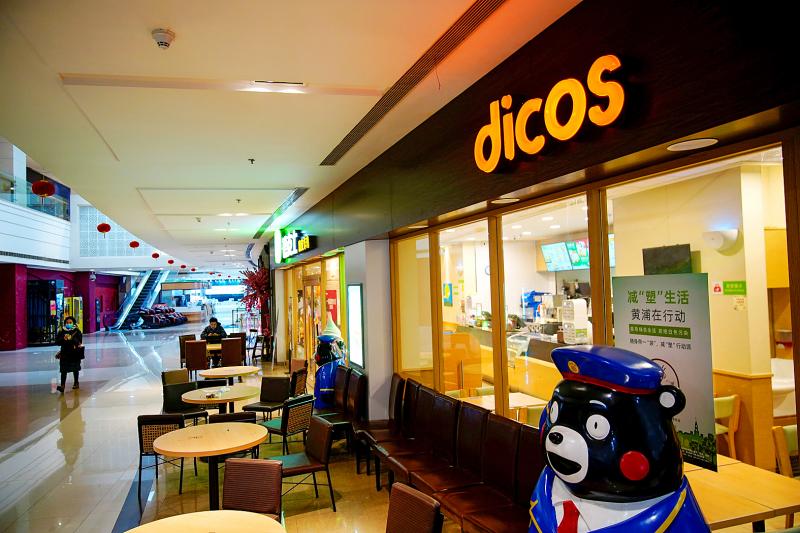US start-up Eat Just Inc yesterday said that Dicos (德克士), one of China’s largest fast food chains, has added plant-based egg products supplied by the San Francisco-based firm to menus at more than 500 outlets across China.
Dicos would replace its conventional egg patty in items such as breakfast burgers and bagels with the US firm’s “Just Egg” — made from mung beans — at restaurants in cities, including Beijing and Shanghai, Eat Just cofounder and chief executive officer Josh Tetrick said by telephone.
Although still a tiny business compared with China’s giant animal-based supply chain, vegetarian alternatives to meat, dairy and seafood are rapidly gaining in popularity.

Photo: Aly Song, Reuters
Euromonitor International, a market research provider, predicted that China’s meat-substitutes market would be worth US$12.3 billion by 2025, up from US$10.8 billion last year.
Tetrick did not disclose financial terms of Eat Just’s deal with Dicos, but he said that the COVID-19 pandemic had renewed concerns about domestic food safety in China.
“There is more awareness in China on safety, on clean protein and protein free of antibiotics,” Tetrick said, adding that his firm was in talks with other Chinese restaurant chains to supply Just Egg.
Dicos confirmed its cooperation with Eat Just on microblogging site Sina Weibo, saying that it was “an innovative new food that helped to support sustainable development for humanity in future.”
Last year, brands such as Starbucks Corp, Kentucky Fried Chicken, Beyond Meat Inc and Oatly rolled out plant-based food and beverage offerings in China, aiming to attract more curious and environmentally conscious diners.

SEMICONDUCTORS: The German laser and plasma generator company will expand its local services as its specialized offerings support Taiwan’s semiconductor industries Trumpf SE + Co KG, a global leader in supplying laser technology and plasma generators used in chip production, is expanding its investments in Taiwan in an effort to deeply integrate into the global semiconductor supply chain in the pursuit of growth. The company, headquartered in Ditzingen, Germany, has invested significantly in a newly inaugurated regional technical center for plasma generators in Taoyuan, its latest expansion in Taiwan after being engaged in various industries for more than 25 years. The center, the first of its kind Trumpf built outside Germany, aims to serve customers from Taiwan, Japan, Southeast Asia and South Korea,

Gasoline and diesel prices at domestic fuel stations are to fall NT$0.2 per liter this week, down for a second consecutive week, CPC Corp, Taiwan (台灣中油) and Formosa Petrochemical Corp (台塑石化) announced yesterday. Effective today, gasoline prices at CPC and Formosa stations are to drop to NT$26.4, NT$27.9 and NT$29.9 per liter for 92, 95 and 98-octane unleaded gasoline respectively, the companies said in separate statements. The price of premium diesel is to fall to NT$24.8 per liter at CPC stations and NT$24.6 at Formosa pumps, they said. The price adjustments came even as international crude oil prices rose last week, as traders

Taiwan Semiconductor Manufacturing Co (TSMC, 台積電), which supplies advanced chips to Nvidia Corp and Apple Inc, yesterday reported NT$1.046 trillion (US$33.1 billion) in revenue for last quarter, driven by constantly strong demand for artificial intelligence (AI) chips, falling in the upper end of its forecast. Based on TSMC’s financial guidance, revenue would expand about 22 percent sequentially to the range from US$32.2 billion to US$33.4 billion during the final quarter of 2024, it told investors in October last year. Last year in total, revenue jumped 31.61 percent to NT$3.81 trillion, compared with NT$2.89 trillion generated in the year before, according to

PRECEDENTED TIMES: In news that surely does not shock, AI and tech exports drove a banner for exports last year as Taiwan’s economic growth experienced a flood tide Taiwan’s exports delivered a blockbuster finish to last year with last month’s shipments rising at the second-highest pace on record as demand for artificial intelligence (AI) hardware and advanced computing remained strong, the Ministry of Finance said yesterday. Exports surged 43.4 percent from a year earlier to US$62.48 billion last month, extending growth to 26 consecutive months. Imports climbed 14.9 percent to US$43.04 billion, the second-highest monthly level historically, resulting in a trade surplus of US$19.43 billion — more than double that of the year before. Department of Statistics Director-General Beatrice Tsai (蔡美娜) described the performance as “surprisingly outstanding,” forecasting export growth